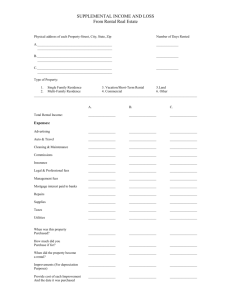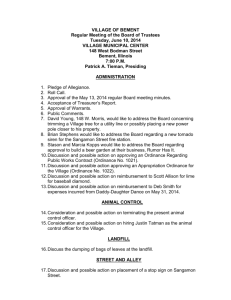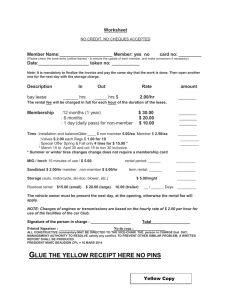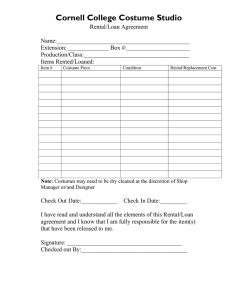Residential Rental Unit Standards and Neighborhood Integrity
advertisement
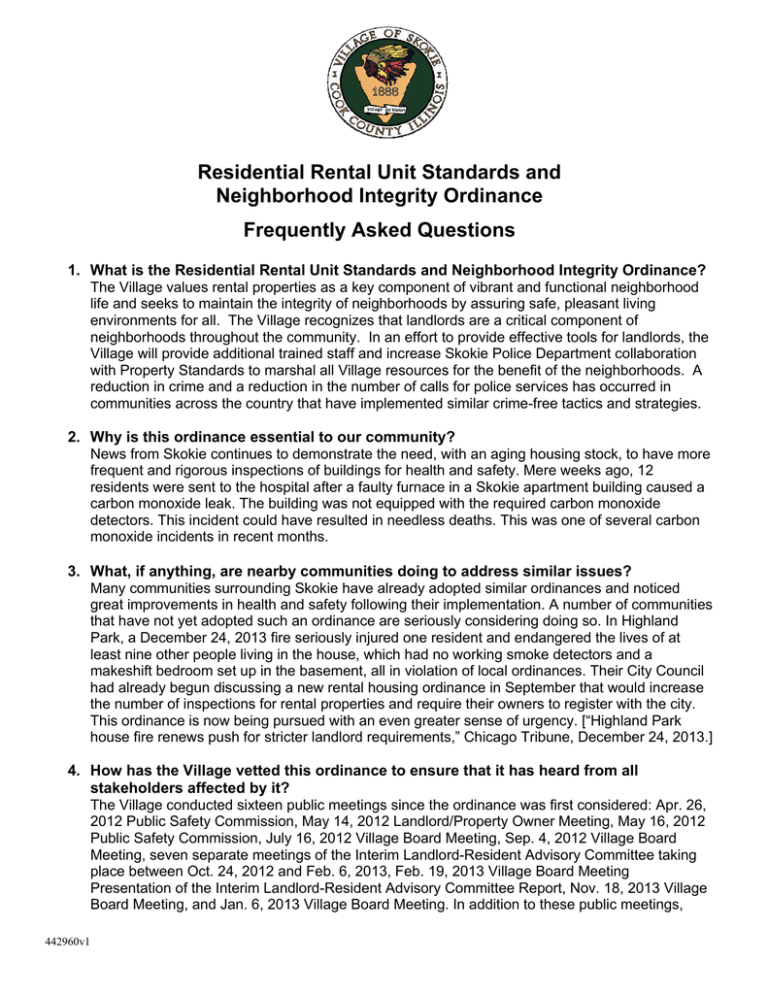
Residential Rental Unit Standards and Neighborhood Integrity Ordinance Frequently Asked Questions 1. What is the Residential Rental Unit Standards and Neighborhood Integrity Ordinance? The Village values rental properties as a key component of vibrant and functional neighborhood life and seeks to maintain the integrity of neighborhoods by assuring safe, pleasant living environments for all. The Village recognizes that landlords are a critical component of neighborhoods throughout the community. In an effort to provide effective tools for landlords, the Village will provide additional trained staff and increase Skokie Police Department collaboration with Property Standards to marshal all Village resources for the benefit of the neighborhoods. A reduction in crime and a reduction in the number of calls for police services has occurred in communities across the country that have implemented similar crime-free tactics and strategies. 2. Why is this ordinance essential to our community? News from Skokie continues to demonstrate the need, with an aging housing stock, to have more frequent and rigorous inspections of buildings for health and safety. Mere weeks ago, 12 residents were sent to the hospital after a faulty furnace in a Skokie apartment building caused a carbon monoxide leak. The building was not equipped with the required carbon monoxide detectors. This incident could have resulted in needless deaths. This was one of several carbon monoxide incidents in recent months. 3. What, if anything, are nearby communities doing to address similar issues? Many communities surrounding Skokie have already adopted similar ordinances and noticed great improvements in health and safety following their implementation. A number of communities that have not yet adopted such an ordinance are seriously considering doing so. In Highland Park, a December 24, 2013 fire seriously injured one resident and endangered the lives of at least nine other people living in the house, which had no working smoke detectors and a makeshift bedroom set up in the basement, all in violation of local ordinances. Their City Council had already begun discussing a new rental housing ordinance in September that would increase the number of inspections for rental properties and require their owners to register with the city. This ordinance is now being pursued with an even greater sense of urgency. [“Highland Park house fire renews push for stricter landlord requirements,” Chicago Tribune, December 24, 2013.] 4. How has the Village vetted this ordinance to ensure that it has heard from all stakeholders affected by it? The Village conducted sixteen public meetings since the ordinance was first considered: Apr. 26, 2012 Public Safety Commission, May 14, 2012 Landlord/Property Owner Meeting, May 16, 2012 Public Safety Commission, July 16, 2012 Village Board Meeting, Sep. 4, 2012 Village Board Meeting, seven separate meetings of the Interim Landlord-Resident Advisory Committee taking place between Oct. 24, 2012 and Feb. 6, 2013, Feb. 19, 2013 Village Board Meeting Presentation of the Interim Landlord-Resident Advisory Committee Report, Nov. 18, 2013 Village Board Meeting, and Jan. 6, 2013 Village Board Meeting. In addition to these public meetings, 442960v1 over the past two months, the Village has met one-on-one with various stakeholders to discuss concerns and new ideas, many of which have been incorporated. 5. What is required for a Residential Rental Unit? Residential rental units must be registered on an annual basis. Previously, the ordinance required a license for each unit and provided the Village the authority to revoke a license. This is no longer part of the proposed ordinance. This amendment was made in response to public comments. 6. What is the goal? The goal is to create a proactive and preventative program that strengthens communication and partnership between landlords, tenants, and the Village, and strives to improve the quality of our rental housing stock, in addition to increasing efforts to confront any criminal activity and creating strategies to support quality landlords. 7. Who is required to register? All owners of a residential rental unit, whether in a multi-unit building or a single-family home, must register with the Village of Skokie. 8. Who is exempt from registration? Any residential rental unit which is owner occupied is exempt. This owner-occupied unit exemption is in response to public comments. Any unit that is occupied but the owner is not charging rent is exempt. Any unit that is vacant and not being advertised for rent is exempt. A rental condominium unit is exempt if located in a building with more than four units. 9. What is the cost of registration? The registration fee is $25 per year. In recognition of landlords that are actively managing their property, any unit with a history of substantial compliance or found to be in compliance with Village ordinances for three consecutive years going forward shall have the registration fee waived. This fee waiver is based on comments received that responsible landlords should be recognized and rewarded. 10. What is the Village Residential Rental Property Landlord Seminar? All property owners will attend a Village-provided training class (or an equivalent). The training class will introduce pertinent Village staff, advance crime prevention principles, highlight best property management practices, and address life safety code issues. The training will not exceed four hours in length and will be offered at different times on various dates. 11. What is a Crime-Free Lease Addendum? This is a tool to help prevent illegal activity on rental property. Any owner entering into a rental lease must utilize a Crime-Free Lease Addendum. The crime-free lease requirement ensures a uniform standard of communication of expectations and responsibilities in the landlord-tenant relationship. By signing the Crime-Free Lease Addendum, the landlord and tenant agree that if a crime is committed the landlord may void the lease and the tenant may be subject to eviction proceedings. It also provides an avenue for the Village to assist in the process. 12. What is the owner identification posting? As recommended by the Interim Landlord-Resident Advisory Committee, the owner shall post a weather-proof sign with his or her name and an active phone number in the multi-unit building’s exterior or common area next to the front door. The sign shall be at least 8 inches by 10 inches. Owner-occupied buildings with four units or less are exempt. 442960v1 13. What is an inspection upon sale? Prior to a multi-unit building or residential rental unit being sold, an inspection will be conducted and violations must be corrected. Inspection will include all common areas and all dwelling units. The Village of Skokie will not issue property transfer stamps until any violations discovered during the inspection are brought into compliance, or a cash bond is posted covering the cost of bringing the property into compliance. 14. What are the Rental Registration Requirements? The rental registration requirements provide effective tools to strengthen the partnership between the Village and rental property owners. A few key components include: owners of rental units are required to register rental units annually; completion of the Village’s Residential Rental Property Landlord Seminar (or equivalent); residential rental units shall be operated and maintained in compliance with all applicable ordinances and regulations; regular property inspections; inspection prior to selling rental property; owner contact information posted; tenant application required; and, Crime-Free Lease Addendum executed between landlord and tenant. 15. What changes have been made to the ordinance since November? In direct response to specific suggestions, the following changes have been implemented: Sec. 22-500: Definition of Residential Rental Unit was clarified regarding its original intent that any unit occupied by residents not being charged rent or vacant and not being advertised for rent is not subject to the ordinance. Definition of Neighborhood Standards Officer modified to include requirement that s/he must receive training in fair housing statutes and domestic violence education. Sec. 22-503: If Owner decides not to rent or lease Unit within ninety days of Registration, Owner may apply for refund of Registration fee. Sec. 22-504: Owner no longer required to contact Neighborhood Standards Officer for consultation. Sec. 22-506: Fee waiver applies retroactively to any building or Unit that was already in substantial compliance as of most recent inspection. Sec. 22-508: Owner meeting certain minimum standards following Registration will be considered a “Certified” Owner/Landlord and may advertise as such for marketing purposes. Sec. 22-511: Buyer may acquire Transfer Stamps even if code violations identified in Inspection Upon Sale have not yet been corrected, provided that cash bond is posted with the Village covering the required work. Also applies to buildings intended for demolition. Inspection Upon Sale requests must be made at least 28 days prior to closing. Sec. 22-512: Owner occupied Multi-Unit Buildings of 4 Units or less are exempted from the requirement to post Owner information on building. Sec. 22-513: Language was clarified regarding original intent that tenant information in written application is recommended, not required. Sec. 22-516: Any Unit not in substantial compliance may still have its Registration Renewed, but the Registration fee is doubled. Sec. 42-43(c): For the purpose of violation of the Crime Free Lease Addendum, section does not apply to victims of domestic violence, dating violence, sexual assault, or stalking. 442960v1

